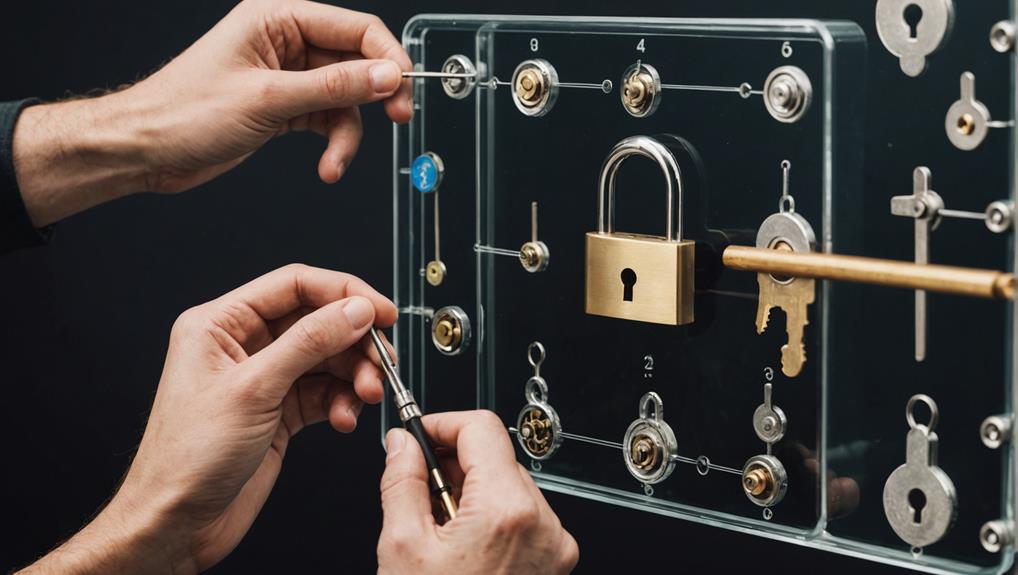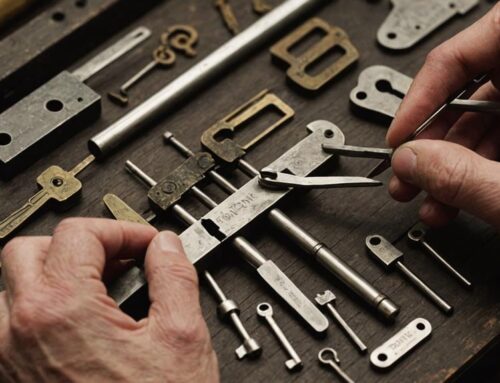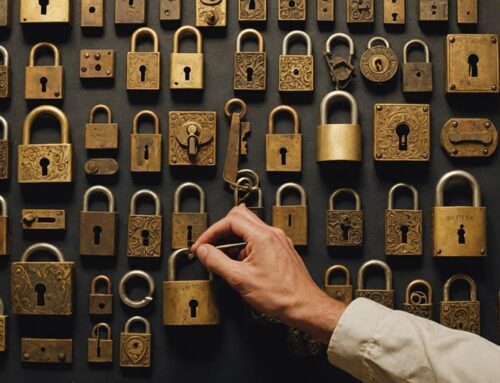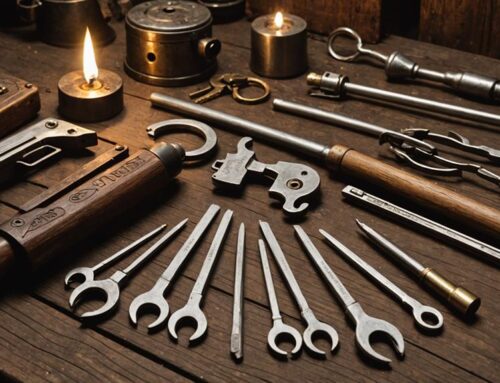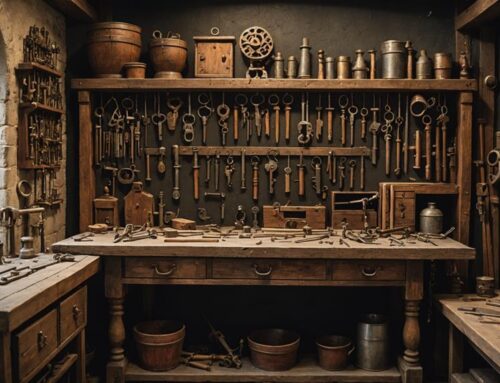Explore the ethical side of lock picking by first understanding local laws and regulations on tool possession and usage. Proper training not only enhances safety but also emphasizes responsibility. Always pick locks with explicit permission to respect property rights and privacy. Accountability is key; maintain confidentiality and promote ethical locksmithing practices within the community. Engaging in positive projects with lock picking can showcase its beneficial aspects. Remember, balancing passion with ethical considerations is fundamental, and further insights await on how to navigate this intricate balance.
Key Takeaways
- Obtain proper training to understand legal boundaries and enhance responsible practices.
- Use high-quality tools and practice on owned locks with permission to minimize risks.
- Respect property rights and privacy by communicating intentions and avoiding unauthorized access.
- Advocate for ethical behavior, promote education, and discourage unlawful activities within the community.
- Engage in community service projects and positive contributions to elevate the craft of lock picking responsibly.
Know the Legalities

Understanding the legalities surrounding lock picking is essential for anyone engaging in this practice. When delving into the world of lock picking, it's vital to be aware of the laws and regulations that govern this activity.
In many places, lock picking is legal as long as it's done within certain parameters. For instance, some states have specific laws that allow individuals to possess lock picking tools if they can demonstrate a legitimate purpose, such as locksmithing or security training lock picking regulations by state.
However, it's important to note that using lock picking tools on locks that don't belong to you without permission is illegal in most jurisdictions. Engaging in legal lockpicking practices involves obtaining explicit consent from the owner of the lock or practicing on locks that you own.
Lock picking laws vary from region to region, so it's advisable to research and understand the specific regulations in your area. By familiarizing yourself with the legal aspects of lock picking, you can guarantee that you're engaging in this hobby ethically and responsibly.
Obtain Proper Training

To properly engage in lock picking, obtaining the right training is essential for your safety.
Understanding non-destructive techniques won't only help you avoid accidents but also guarantee you approach the practice ethically.
Training Is Essential
Proper training is essential when delving into the world of lock picking. Ethical lock picking and responsible lock picking practices are closely tied to the knowledge and skills acquired through adequate training. By receiving formal instruction or guidance from experienced individuals, you can't only learn the technical aspects of lock picking but also understand the ethical considerations involved.
Training in lock picking goes beyond just learning how to manipulate locks. It provides you with a deeper understanding of the mechanisms involved, the legal implications of lock picking, and the importance of using your skills responsibly.
With appropriate training, you can develop the necessary dexterity and knowledge to approach lock picking as a hobby while upholding ethical standards.
Remember that training isn't only about honing your technical abilities but also about fostering a sense of responsibility. Ethical lock picking involves using your skills in a lawful and considerate manner, respecting the boundaries set forth by the law and the safety of others.
Safety First
When starting on your lock picking journey, your top priority should always be safety. Ethical considerations and responsible lockpicking go hand in hand with ensuring the safety of yourself and others.
Here are five crucial safety tips to keep in mind:
- Obtain Proper Training: Before attempting to pick any locks, seek out reputable resources for training. This will give you the necessary skills and knowledge to practice lock picking safely.
- Use the Right Tools: Make sure you're using high-quality lock picking tools that are suitable for the task at hand. Using the wrong tools can damage the lock or cause injury.
- Practice in a Controlled Environment: Start practicing in a safe and controlled environment to minimize the risk of accidents or damage to property.
- Respect Others' Property: Only practice lock picking on locks that you own or have explicit permission to work on. Avoid picking locks that are in use or that you don't have permission to access.
- Know When to Stop: If you encounter a lock that you can't pick or if you feel uncomfortable, it's vital to know when to stop. Pushing yourself beyond your limits can lead to frustration or potential harm.
Respect Others' Property
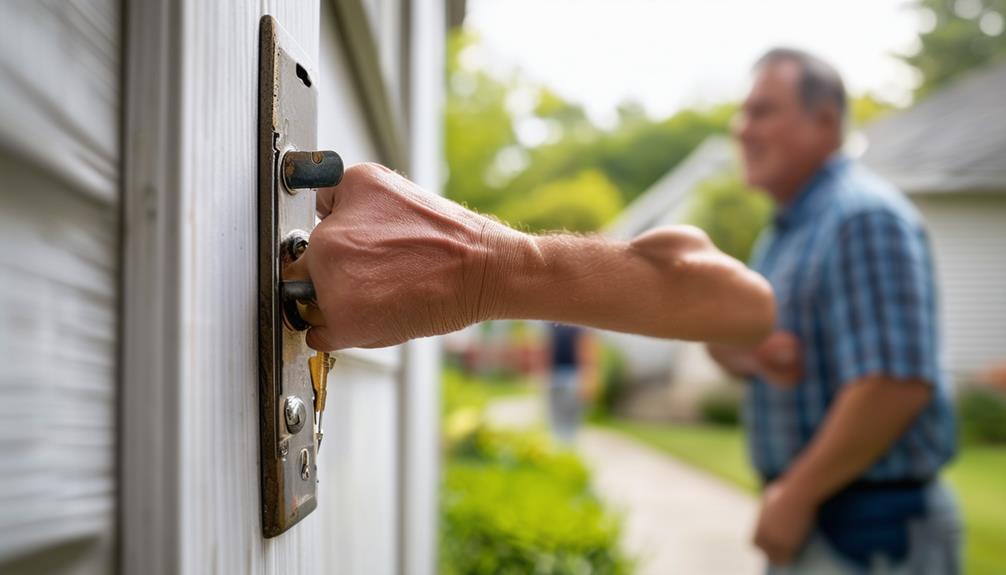
Respecting others' property is a fundamental principle in lock picking ethics. In the domain of ethical lock sport, it's essential to uphold values that prioritize the integrity and security of individuals and their belongings.
When engaging in lock picking as a hobbyist, it's important to always remember the significance of respecting the property rights of others. This means refraining from using your lock picking skills to gain unauthorized access to someone else's possessions, whether it be a home, a car, or any other secured item. Engaging in lock picking without consent can expose you to various potential legal risks, which can have serious consequences.
As a responsible practitioner of ethical lock sport, it's crucial to only use your skills on locks that you own or have explicit permission to pick.
Engaging in lock picking without consent can't only lead to legal consequences but can also damage the trust and sense of security within a community. By respecting others' property and obtaining proper authorization before picking locks, you can guarantee that your hobby remains ethical and enjoyable for all parties involved.
Use Skills Responsibly
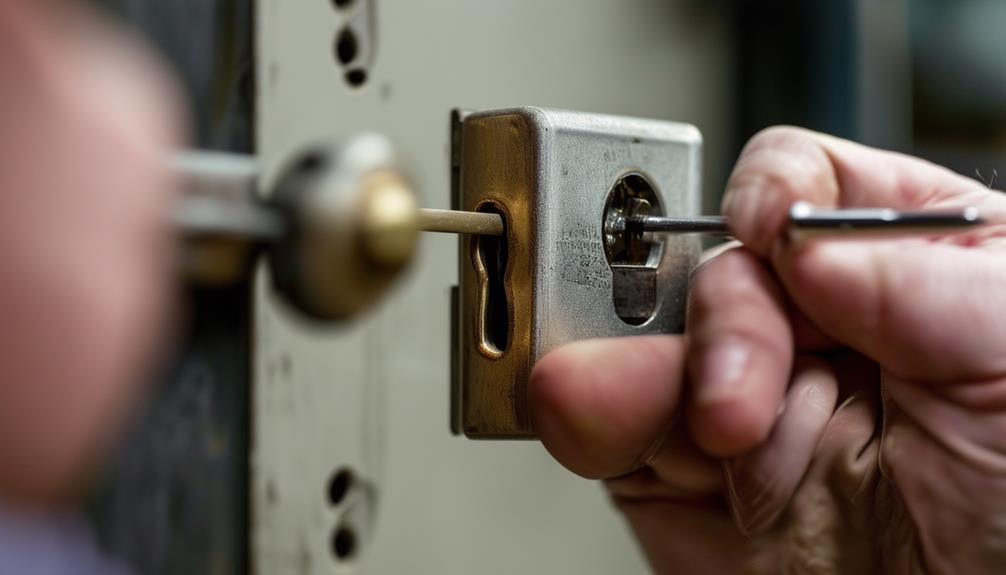
When it comes to lock picking, it's vital to use your skills responsibly.
Understanding the legal and ethical considerations surrounding this hobby not only enhances your experience but also guarantees that you engage in practices that reflect your values and integrity.
Being mindful of accountability and understanding the potential consequences of your actions is essential in practicing responsible lock picking.
Ethical Use of Skills
To guarantee ethical use of your lock picking skills, it's crucial to exercise discretion and responsibility in applying them.
As a hobbyist, your actions can impact the perception of the entire lock picking community. Here are some ethical lockpicking tips to guide you in using your skills responsibly:
- Legal Boundaries: Always verify that you're abiding by the laws and regulations concerning lock picking in your area.
- Permission: Only pick locks that you own or have explicit permission to practice on.
- Confidentiality: Don't disclose your lock picking techniques or assist others in unlawful activities.
- Emergency Situations: Use your skills responsibly in situations where you're legitimately locked out and need to regain access.
- Education and Advocacy: Educate others about responsible locksmithing practices and promote ethical behavior within the lock picking community.
Accountability and Consequences
In ensuring the ethical use of your lock picking skills, it's essential to understand the potential accountability and consequences that come with wielding this expertise. Upholding lockpicking ethics is critical to avoid legal issues in lock picking.
While honing your skills, remember that unauthorized entry into someone else's property, even if done with good intentions, can have severe repercussions. It's essential to use your abilities responsibly and only in situations where you have explicit permission to practice your craft.
Legal consequences for improper use of lock picking can range from fines to criminal charges, depending on the circumstances. Additionally, engaging in unethical behavior can damage your reputation and credibility within the lock picking community.
It's important to always act with integrity and respect the boundaries of others' property rights.
Educate Others Ethically
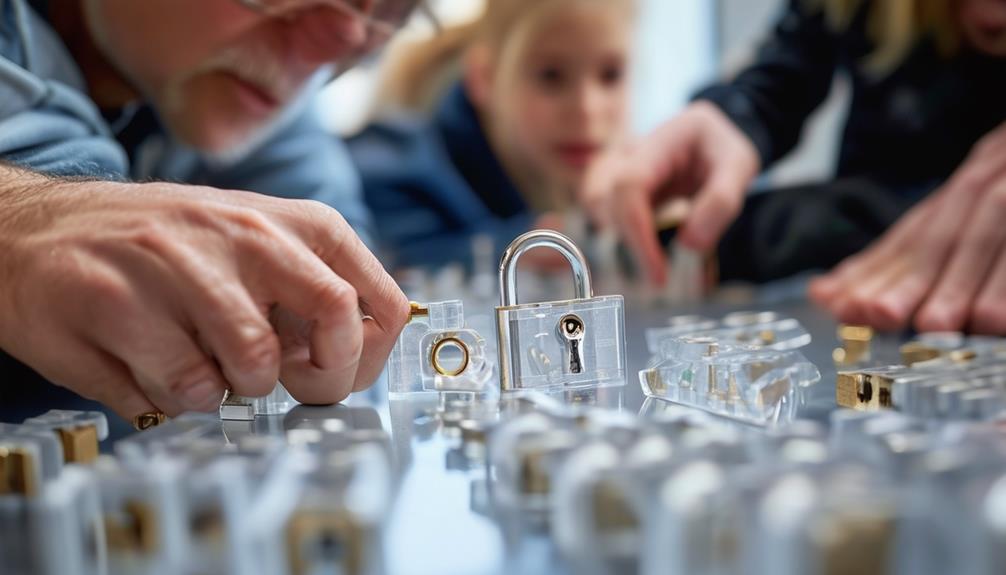
Share your knowledge of lock picking responsibly and ethically by emphasizing the importance of legal and ethical use. As a hobbyist lock picking enthusiast, it's vital to educate others in a responsible manner to guarantee the integrity of the craft. Here are some key points to reflect on:
- Emphasize Legal Use: Stress the importance of only using lock picking skills on locks that you own or have explicit permission to pick. Understanding the safe practices for all can help reinforce these principles.
- Highlight Ethical Boundaries: Encourage others to respect people's privacy and never use lock picking for unlawful purposes.
- Promote Responsible Learning: Advocate for learning lock picking as a hobby rather than a tool for nefarious activities.
- Encourage Positive Contributions: Discuss how lock picking skills can be used for ethical purposes like locksmithing or improving security.
- Discourage Misuse: Make it clear that lock picking should never be used for unauthorized access or illegal activities.
Stay Informed on Regulations

If you're passionate about lock picking, it's vital to stay informed on regulations governing the practice. As a hobbyist, understanding the legal implications of lock picking is fundamental to guarantee you're engaging in this activity ethically and responsibly.
Regulations surrounding lock picking can vary from state to state and country to country, so it's important to familiarize yourself with the specific laws in your area. Engaging in lock picking without proper knowledge can lead to unintended legal consequences, so navigating legal risks should be part of your preparation.
To stay informed on regulations, consider researching online resources, consulting with local law enforcement agencies, or joining lock picking communities where members share information about legalities.
Being aware of the laws won't only help you avoid potential legal trouble but also contribute to promoting a positive image of lock picking as a legitimate hobby.
Frequently Asked Questions
Can Lock Picking Be Used for Illegal Activities?
Yes, lock picking can be used for illegal activities.
Criminals may exploit this skill to break into properties unlawfully. It's vital to use your knowledge responsibly and ethically.
Always make certain you have explicit permission to pick a lock.
Remember, with great power comes great responsibility.
Stay vigilant and avoid engaging in any activities that may compromise your integrity or the security of others.
How Can I Ensure I Am Not Violating Any Laws?
To make sure you're not breaking any laws while lock picking, research your local regulations on owning lock picking tools.
Always obtain permission before attempting to pick a lock that doesn't belong to you.
Use your skills responsibly and ethically, only practicing on locks you own or have explicit permission to open.
What Should I Do if I Accidentally Damage a Lock?
If you accidentally damage a lock, the first thing to do is stay calm.
Assess the situation and determine the extent of the damage. It's crucial to take responsibility for your actions.
You should contact a professional locksmith to repair or replace the damaged lock.
Apologize if necessary and offer to cover the costs of the repairs.
Learning from this mistake will help you avoid similar situations in the future.
Is It Ethical to Teach Others How to Pick Locks?
Teaching lock picking can be a double-edged sword. While it can empower individuals to understand security vulnerabilities, it also raises concerns about potential misuse.
Consider the locksmith who trains apprentices in legitimate locksmithing skills, fostering a professional trade. However, if the knowledge is shared without proper safeguards, it could fall into the wrong hands.
Ethical teaching should emphasize responsible use and respect for property rights.
How Can I Stay Updated on Changing Regulations?
To stay updated on changing regulations, keep an eye on official websites, subscribe to newsletters or forums related to lock picking, and follow relevant social media accounts.
Actively engage with the lock picking community to discuss any new developments or legal changes.
Conclusion
To sum up, it's important to approach lock picking as a hobby with ethical consideration. Did you know that over 50% of home burglaries in the United States happen without forced entry? By practicing responsible lock picking techniques and promoting ethical education, hobbyists can help improve security awareness and prevent unlawful entry. Remember, with great skill comes great responsibility. Stay informed, stay ethical, and enjoy your hobby responsibly.

